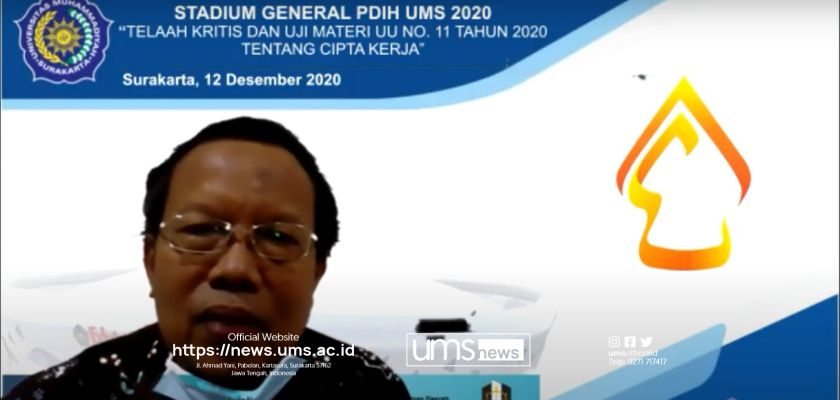
The Doctor of Law Program at the University of Muhammadiyah Surakarta (UMS) together with the Central Java Muhammadiyah Regional Leadership and Human Rights Council (PWM), Muhammadiyah Youth Regional Leaders (PDM) Surakarta and MACNUM held a critical discussion and review of materials on Law No. 11 of 2020 about job creation.
The discussion in the studio generale format was held on Saturday (12/12/2020). On this occasion, presenting a number of presenters, namely the Chairman of the PP Muhammadiyah Law and Human Rights Council, namely Dr. Trisno Raharjo, S.H., M. Hum, Prof. Dr. Suteki, S.H., M.Hum, Specialist in Constitutional Law UGM Yogyakarta Dr. Zainal Arifin Mochtar, S.H., LL.M and Prof. Dr. Absori, S.H., M. Hum. Professor of Law at UMS.
As is well known, the Job Creation Act (UU Ciptaker) was officially ratified at the plenary meeting of the House of Representatives of the Republic of Indonesia (DPR-RI) in Senayan, some time ago. Although it has been ratified, it turns out that the Law that is incorporated in the Omnibuslaw is still interesting to discuss, considering that before it was ratified, it caused many pros and cons.
On the occasion of this discussion, Dr. Trisno Raharjo, S.H., M.Hum started by saying that Indonesia is the most “complicated” country. “Based on the Global Benchmark complexity index in 2020, Indonesia is the most “complicated” country. Starting from 2013, Indonesia was ranked as the 5th most complicated country. 2014 became the number 9 country. In 2015, it started to get complicated again, it was ranked 2. In 2016 it improved again to rank 6, then 2017 was very good to be ranked 37. In 2018 it got even better to be number 46. But suddenly we fell into 2nd again . And in 2020, Indonesia will become the champion as the number 1 most complicated country,” he said.
The confusion is due to overlapping laws and regulations. For this reason, it is appropriate that legal experts need to conduct a review of the judicial review of this Law. “Of course I became concerned, especially after the work copyright law was passed,” he said, starting his presentation from the perspective of political law.
According to him, the job creation law with an omnibus law pattern is not properly described in the preparation of the job creation law. And it is not known in the Law on the Establishment of Legislation. “We don’t have a solid basis on how to draft a work copyright law through an omnibus law pattern,” he continued.
He said that the drafting of the job creation bill was like an inside story with a “drakor” or Korean drama. “One of the drakors is the job creation bill. Due to the Covid-19 pandemic, when the drafting of the job creation bill there were no views from mass organizations, how come the DPR suddenly changed the initial goal of increasing investment to economic recovery. Then came the president’s request asking for support from the Constitutional Court, and asking the DPR to complete the discussion within 100 days, it’s like the old story, namely the construction of temples, “said Trisno.
Another speaker is Prof. Dr. Suteki, S.H., M.Hum, who looks at it from a manpower perspective, predicts the disadvantages of Law No. 11 of 2020 concerning job creation for workers. Starting from the process of his journey, he saw that although there were many protests aimed at the DPR and the President, it seemed that they were not being noticed and even tended to be desperate to speed up the completion of the Omnibuslaw Bill in a “catch-up” way.
“From all versions, the point is the same, the Job Creation Omnibuslaw Law is considered dangerous, because the Cipatker Law uses a capitalistic liberal approach in managing natural and human resources, so it is not in accordance with the constitution and the views of the nation’s founders,” said Professor of the Faculty of Law, Diponegoro University, Semarang. that.
While Prof. Dr. Absori, S.H., M.Hum, Professor of Legal Studies at UMS, said that from the perspective of environmental law, he stated that the Job Creation Law regulates several provisions that are considered to weaken the protection and enforcement of environmental law.
“These provisions regulate problems in the field of administrative law, namely environmental licensing, in the field of civil law regarding absolute responsibility and the field of criminal law regarding criminal sanctions,” he explained.
UGM Yogyakarta constitutional law expert, Dr. Zainal Arifin Mochtar, S.H., LL.M simply gives 3 notes for the Job Creation Law, namely the first Omnibuslaw Law in terms of Paradigmatic, Omnibuslaw Law in which there are elements of development, oligarchy, autocratic legalism and Pseudo Democracy.
Substance and technique of preparation and follow-up, Zainal said Law number 12 of 2011 does not adopt omnibus. There are many typos in articles and the lack of a public role in conveying aspirations.
